
Welcome to Faculty Insights, an opportunity to meet some of our exceptional faculty outside the classroom. Insights offer an opportunity to get to know each guest as a person as well as a member of the faculty here at SOU.
Profile #11 — Kelly Szott, PhD
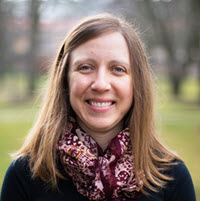 (Kelly's Podcast and video posted September 23, 2021—27:21 run time)
(Kelly's Podcast and video posted September 23, 2021—27:21 run time)
“You just don't know when this can happen.”
Growing up in the Midwest, Kelly had a lot of opportunities to gain firsthand knowledge during her work with at-risk young women on the street in Detroit where she was introduced to the concept of Harm Reduction. While working in New York City first as a methadone counselor and then as a research assistant on a study of hepatitis C, she deepened her knowledge of this approach to responding to risky behavior.
The definition of Harm Reduction? A philosophy of care or a set of practices reducing the riskiness of behavior. This approach isn't just applied to drug use, by the way. It can be applied to wearing seat belts, using condoms, and drinking alcohol. Kelly made it clear that it is not a case of saying “don't do it.” It is saying if you’re going to do it, then how can it be done in a safer way?
We move on to discuss how drug use is seen and specifically how drug users are treated by the institutions that are supposed to help them. There is the sociological viewpoint, which involves looking at social patterns of substance use and its disparate impact on different communities. Consider this a macro approach if you will. Compare this to the psychological perspective— basically getting inside the heads of users, looking for the why.
There has been a big change in public perception and viewpoints on using drugs. Attitudes range from a proposal limiting EMT responses to opioid overdoses—three strikes and you are out—to providing supervised injection facilities. Being the person to reverse an overdose with Narcan can be scary. It also raises emotional questions. Kelly brings this point home when she shares the experience of a student's boyfriend overdosing on Fentanyl.
We finish up with Kelly’s goals for future directions at SOU. She hopes to get a program started for students to become Certified Alcohol Drug Counselors. Oregon has one of the lowest number of treatment centers, with the state ranking 47th nationally. And for a big dream? Work with others to open a Harm Reduction Center in Medford, perhaps connecting it with student internships and research.
Profile #10: Erik Palmer, PhD
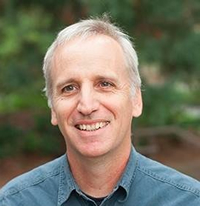 (Erik's Podcast and video posted May 25, 2021—37:25 run time)
(Erik's Podcast and video posted May 25, 2021—37:25 run time)
“Facebook isn't really grasping the risk that they face.”
When I wanted to know more about the three most actively evolving aspects of communication: social media, journalism and photography, and how they are evolving at SOU, I went to Associate Professor Erik Palmer. Originally from Texas, he has earned multiple degrees, with significant professional experience to build on. He has twice been honored with Tow-Knight Fellowships in Disruptive Journalism Education and convened with cohorts of Disruptive Fellows at the Online News Association’s 2017 and 2018 conferences in Washington, DC, and Austin, Texas.
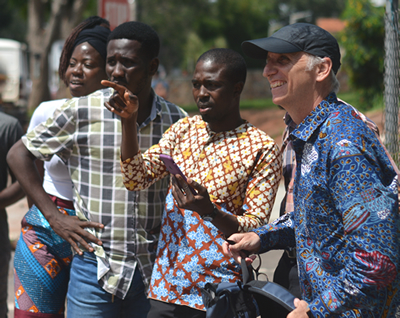 We begin with his recent trip to Ghana as a U.S. Fulbright Scholar. During that time, he was teaching classes as well as conducting research relating to the practice of professional photojournalism. Almost as a sidebar, he connected with a self-proclaimed group of “comic nerds.'' Yes, all of the American franchises transfer culturally. But there is also a strong community developing an interest in African-generated stories. The result is a bump in local publishing and creators, with superheroes that speak to today’s African cultural audience. This is a big market and a lot of economic opportunity, as well as a creative opportunity for media with an authentic African voice.
We begin with his recent trip to Ghana as a U.S. Fulbright Scholar. During that time, he was teaching classes as well as conducting research relating to the practice of professional photojournalism. Almost as a sidebar, he connected with a self-proclaimed group of “comic nerds.'' Yes, all of the American franchises transfer culturally. But there is also a strong community developing an interest in African-generated stories. The result is a bump in local publishing and creators, with superheroes that speak to today’s African cultural audience. This is a big market and a lot of economic opportunity, as well as a creative opportunity for media with an authentic African voice.
The conversation moves back to SOU and begins with changes in journalism. We discuss the political landscape, business models, and changing economic picture. The career landscape is changing from the old model in which entry-level reporters often started out by writing obituaries, to a new opportunity to go directly to the key areas of your interest. Today, when you hit the right formula, people care about it and it can be very rewarding. It is so encouraging to hear that even a smaller school like SOU can be at the cutting edge of what's happening in journalism.
We discuss the pervasive feeling that there's a toxic or at least unrewarding environment in social media. Some people are dropping out, turning off. Yet Erik is more optimistic than pessimistic. He says that Facebook is resistant to change because Facebook isn't really grasping the risk that they face. Like it or not, social media is not going away. Can social media remain relevant and create a viable business model?
Discussing photography brings up the old-school film cameras versus today’s digital and electronic equipment. Do our tools drive the content or are we better because of technological advances? SOU has had a great tradition of photojournalism and Erik has redesigned and reinvented several classes. The goal is to motivate students to think of photography as a craft, not just pressing the shutter, to develop stories using higher-order skills.
In looking ahead, Erik points out that, “The three primary disciplines in the Comm program play way above their weight class.” Our facilities here are excellent, with the Digital Media Center a prime example. The goal is to use the sense of small school innovation in higher education—get students working together and collaborating in ways that will simulate what they will experience in the real world.
We finish by discussing challenges in enrollment and funding. We are fortunate to have an exciting group of faculty who have the capacity to embrace upcoming changes, enabling SOU to be nimble enough to come up with new courses and new programs.
Visit Erik’s website to see examples of his work.
Profile #9: S. Anandavalli, PhD
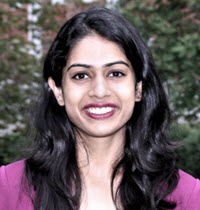 (Valli's Podcast and video posted April 26, 2021—31:00 run time)
(Valli's Podcast and video posted April 26, 2021—31:00 run time)
“This idea of trauma-informed teaching has become very salient at this point, very obvious.”
Preferring to be called Valli, my guest tells me of her emigrating from India, and how that background shaped her visions of wellness and mental health. We then move into a discussion of some of her efforts to assist the students and faculty who are dealing with issues of isolation during Covid and how the impact of that work is modifying her teaching. We then address ideas for those problems through the concept of mindfulness.
The Masters in Mental Health Counseling is a two-year, cohort-based program. The events of the last year—the pandemic, devastating wildfires, racial unrest—have disrupted the sense of community which is foundational for our students to do the deep personal introspection that the program requires. Valli has found that creating opportunities for unstructured communication among her students has been key to establishing and maintaining critical connections within the cohort. She also emphasizes the need to remember that students have multiple roles beyond the classroom and describes how those roles may affect their class participation.
We take a deep dive into the topic of mindfulness, what it is and what it is not. Valli is working with Dr. Paul Condon in one of our campus Innovation Communities and their work will soon be available. In the meantime, Valli refers us to freely available resources for those who are interested, from brief two-minute exercises up to an entire 8-week course on mindfulness-based stress reduction (MBSR).
We discuss Valli's identity as a feminist and intersectional researcher and how this impacts the use of information gathered and presented from several vantage points. We conclude by discussing how some groups face both hypervisibility, based on stereotypes of sexuality, and invisibility, when it comes to respect and dignity.
Free 8-week Online MBSR/Mindfulness Course
Profile #8: Karen Mager, PhD
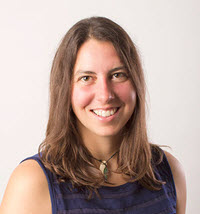
(Karen's Podcast and video posted January 8, 2021—28:30 run time)
“We’re in a world where environmental problems are everywhere and they are not going away. We need so many people to do that work.”
Growing up in Minnesota led to camping and trips in the wilderness, leading to a love of the outdoors. In addition to heading off to college, Karen took a 6-week canoe trip to the Canadian Arctic without resupply. She had so much fun she began taking other groups of women on similar trips to explore the wilderness, spending hundreds of days leading remote excursions and observing a diversity of ecosystems with curiosity. It seems a forgone conclusion she would end up as a wildlife ecologist, and that is what she did.
After earning her undergraduate degree, she was awarded a Fulbright scholarship to University of Lapland (in Finland, by the way) above the Arctic Circle. She then continued to earn her PhD at the University of Alaska. After graduating with her PhD, she took time to travel the world for a year with her husband.
Besides her path to SOU, we also talked about her approach to including diversity in the classroom and how to include traditionally underrepresented learners in her classes. A key strategy is ensuring the students know and feel they belong. Given the quantity of stereotypes and misconceptions about science that currently circulate, she focuses on sharing the value of this course of study. Future plans include collaboration with Ashland’s North Mountain Park staff for students to collect outdoor lab data using motion-activated camera “traps.”
As a bonus, we learn that caribou and reindeer are really the same thing, and do, in fact, pull sleds! Join us for a visit with a new faculty member who brings an impressive portfolio of travel, experience and passion for her chosen field.
Profile #7: Shawn Patterson, PhD
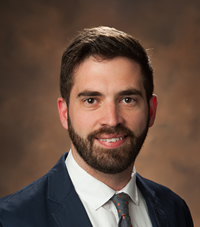 (Shawn's Podcast and video posted November 19, 2020—29:21 run time)
(Shawn's Podcast and video posted November 19, 2020—29:21 run time)
“I want my students to leave my classroom with the same appreciation for politics that I have for football.”
Shawn always wanted to be a teacher, even as far back as the 6th grade. His goal was to teach high school Geometry to 10th graders. Fate intervened when he fell asleep in one of his undergrad math classes and woke up to find Prof Wendy Schiller teaching her American Presidency class. He didn’t have to listen long before deciding, “This is better” and changing majors.
The current Covid pandemic has kept him back East, but it won’t keep him out of the classroom. We talked about the pros and cons of teaching via Zoom. Like most, he prefers to work face to face. He admits that there are some advantages to the 1 to 1 interactions you can get in a class, especially when at student work on the screen or holding office hours. He has also found “flipping a class” to be very valuable in his discipline to allow for review of material prior to class.
His approach to teaching through the contentious political climate of today is simply great. He explains that while an ardent Eagles fan, he can appreciate the decisions and plays of the other teams, even the Cowboys. That appreciation is the missing piece. He feels the current situation is the result of a long road traveled, 40 years worth. We go on to discuss the “what happens now” phase. He explores how changes need to happen at all levels of politics—local, county, state—as well as at the national level. He prides himself on his students not knowing his personal preferences, and keeping it that way helps guide his discussions.
Hopefully, he and his family will be able to join us soon. I look forward to sitting in on one of his classes. I’ll make sure I wear my green Eagles jersey when I do.
For more information: The Righteous Mind by Johnathan Haidt
Profile #6: Larry Gibbs, PhD
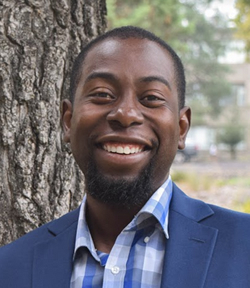 (Video posted October 22, 2020—18:24 run time)
(Video posted October 22, 2020—18:24 run time)
When Larry sat down with us, our intention was to find out about some of the techniques that were used in SOAN to combat the feelings of isolation and separation that many of us have been experiencing during the pandemic. One approach was to bring the family to a virtual staff meeting, with snacks. That event developed into a drop-in gathering on the department Chair’s patio where social distancing and masks couldn't dampen the positive impact of the meeting.
Our conversation touches on the impact of teaching international students and the significant time challenges that can bring, then moves on to the effect that current events can have on teaching. Larry talks about how surreal it was to be teaching your students about pandemics in an epidemiology course and racial unrest in a sociology course as related events were taking place in real time. The power of the course content being from real life—not a journal or text—made for a term unlike any other.
Profile #5: Marianne Golding, PhD
(Marianne's Podcast posted May 18, 2020—27:27 listening time)
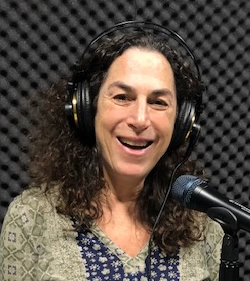 “Your class always sounds so happy!”
“Your class always sounds so happy!”
When I discovered Dr.Golding was born and raised in France, it only seemed fitting to start our interview with a peppy French song. We talked it over and she recommended a song one of her students liked, Les Passants by a group called Zaz. With Marianne, it’s all about the students.
Her journey began when, on the advice of her mother, Marianne used her dual citizenship at age 19 to come to the US. She had already completed a year at the Sorbonne when she moved to the States and then finished her studies here, earning a PhD at UCLA. In 1998, she was offered a temporary teaching position at SOU. Accepting the position was a good call as, so far, it’s been 22 years and counting.
Not too big on stereotyping, she informed me that she IS French but doesn't cook. Her British husband is a great cook and deftly takes care of those duties. She has three children, runs daily, and what she does for fun is research.
Although her family was impacted by the Holocaust, she found herself turning her back on it for a number of years. As time passed, she began to want to learn more about her father's story which turns out to read like a movie script complete with a daring escape being smuggled out of danger in the trunk of a car. Marianne came across some interesting background information which combined with letters and old documents to pique her interest. This began a research project tracing family roots and travels. Through her research, she located and met some of the other survivors of her father’s adventures, learning firsthand how their tales were woven together. To wrap it up and validate the work, she presented here at SOU in January 2020.
Marianne speaks to the value of learning a language for anyone regardless of their major, and her unique style of gradual immersion when she teaches. While discussing the development of the program and her career I found that she had been awarded not one, but two teaching awards on the strength of recommendations from both peers and her students. One observer summed it up simply,” Your class always sounds so happy!”.
Without a French major at SOU, Marianne discusses alternative ways for students to cultivate an interest in languages, including study abroad programs. She takes groups to the south of France each summer as part of the Summer Language Institute. It’s a tough job, but someone has to do it! Merci beaucoup, Marianne!
The song is Les Passants by Zaz.
© 2010 Play On/Warner Music France, a Warner Music Group Company. All rights are credited to the owner. Shared for educational use.
Profile #4: Alison Burke, PhD
(Alison's Podcast posted March 10, 2020—29:09 listening time)
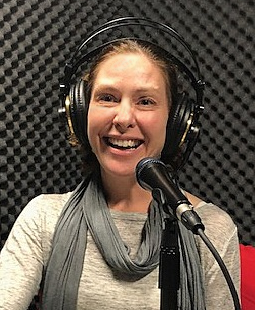 “It makes my heart so happy to see that.”
“It makes my heart so happy to see that.”
Occasionally I have those “what just happened?” moments. Like when my 93-year-old mother called me “Dude.” This interview was one of those moments. After gaining a sense of her educational background and training, Alison reveals her rather interesting mentor and details for an upcoming exciting adventure. I teased her about there being luggage in the waiting room and an Uber idling outside as we did our interview. It wasn’t quite that imminent, but when this interview airs she will be in the Republic of Bosnia and Herzegovina to present workshops on Women in Crime, having been awarded a Fulbright for the four-month trip.
Alison is an avid trail runner, and will be running in the Transylvania 100K, an event that begins at Dracula’s Castle while she is there. She reports that participants have been warned about bears and wolves along the route. Oh yes, and since she is there? She is invited to present at the 29th UN Women's Conference in Vienna.
Her SOU students have benefited from a number of trips across the Atlantic as part of a summer “Study Away” program including visits to London, Paris, and then The Hague and Amsterdam. It was great for her to see CCJ students as ambassadors.
When it comes to the CCJ classroom, Criminal Theory and Juvenile Offenders are her specialties. She also focuses on the role of women in crime, and identifying and taking on educational bias. She discusses some of the new pedagogical techniques she is using to keep her classes fresh and describes the mock trial she recently held in class (with a special guest judge) and some future goals for the CCJ program that are percolating away.
She wraps up with tips for prospective students and her work locally with RESOLVE, a mediation organization that is helping students in trouble within the Medford schools. She has promised to come back and do a follow-up after her trip. I’m hoping for a wooden stake from Dracula's Castle, but I won’t push it.
Details on the Transylvania 100K race
Outtake: The initial telling of the SOU in London story (4:02)
Profile #3: Craig Wright, PhD
(Craig's Podcast posted February 9, 2020—23:53 listening time)
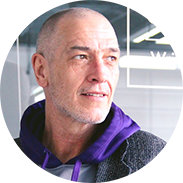 “Looking for, well, ‘interestingness,’ right?”
“Looking for, well, ‘interestingness,’ right?”
It is so refreshing to sit down with someone who is highly accomplished to discover they are just folks. Craig Wright fits that description and is an excellent choice for the Faculty Insights series. He has taught in the area of creativity for 26 years — short stories, poetry, songwriting and fiction. He is a published author and so much more; his music has appeared on television shows such as Sons of Anarchy and Lucifer. It pays to watch the credits on TV shows.
With all those accomplishments, what is he most excited to talk about? What his sons are up to and the success of a former SOU student, Abbigail Rosewood, who has recently published her first book to great critical success. Discussing performing, he casually mentions his own musical performances in the Bay Area and at the Oregon Country Fair.
Craig discusses how writing and literature have changed over the past quarter-century, examining past trends and looking forward. He doesn't fault the current obsession with superheroes and memes, but sees them more as a metaphor for what society is currently going through. He looks for “interestingness” in the work of his students as a sign of a true voice.
Craig wraps up our interview with a comment on his mentor, James Dickey, and some tips for students that were given to him by the CEO of Target. When it comes to writing? As the Nike slogan says, “Just Do It.” Join us for an amazing half hour.
And don't miss Craig in action at the St. Valentine's Day Massacre Poetry event on February 17 in AB 124 at 3:45!
Bonus links:
Ashland Talent Pool: Three-Legged Dog, Craig Wright, lead vocal
Abbigail Rosewood, “If I had Two Lives”
Profile #2: Tiffany Morey, MS
(Tiffany's Podcast posted January 8, 2020—27:45 listening time)
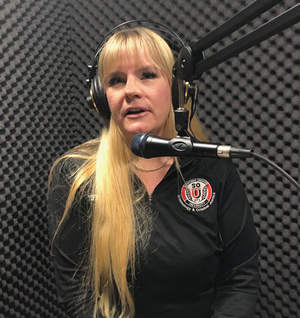 Tiffany Morey of SOU’s CCJ program is an excellent choice to kick off the Faculty Insights podcast series. Prior to joining SOU, Ms. Morey had what she calls her “first career.” She worked in Las Vegas as a police officer, becoming part of the 1% of the force that was female. She has been pushing barriers ever since.
Tiffany Morey of SOU’s CCJ program is an excellent choice to kick off the Faculty Insights podcast series. Prior to joining SOU, Ms. Morey had what she calls her “first career.” She worked in Las Vegas as a police officer, becoming part of the 1% of the force that was female. She has been pushing barriers ever since.
Not only was she one of the first patrol officers, she was also the first officer to become pregnant. This moved her out of patrol and into Community Relations where she presented the human side of police and law enforcement through a variety of programs, including dealing with a gang-infested neighborhood with a high murder rate. Some of her other firsts were learning to ride horses for the mounted patrol division and power slide a mountain bike. A highlight for her was pulling over a semi-truck from her mountain bike—no telling who was more surprised that it worked!
Tiffany eventually became a part of the now famous CSI Las Vegas team, which is a lot different than what you see on television. She could have stayed there her whole career, but she wanted to climb the ladder and take a shot at breaking through the glass ceiling.
Her second career brought her to Ashland and SOU where she gets to do “a lot of the fun stuff” in the program. She points out that SOU has one of the top programs in the country and has warm words for her co-workers. She offers some good advice for prospective students interested in law enforcement about the impact of social media and drug use on future jobs, regardless of their major. The interview concludes with a positive report of local law enforcement and the expanded numbers of women in the profession. I hope you’ll join us and spend an enjoyable half hour. And if you see a mountain bike behind you flashing red and blue? Pull over.
Bonus Outtake - CSI Las Vegas, the real story (4:53 listening time)
Profile #1: Clayton Austin, PhD
(Clay's Podcast posted November 27, 2019—9:03 listening time)
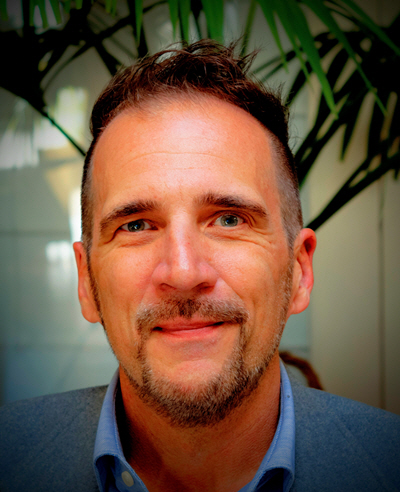 Our guest today is Dr. Clayton Austin, the Director of the Center for the Advancement of Teaching and Learning.
Our guest today is Dr. Clayton Austin, the Director of the Center for the Advancement of Teaching and Learning.
We found out early on that Clay is from “great Commonwealth of Kentucky" and you may catch a telltale drawl in his voice now and then. Clay has an extensive background in faculty development and has taught every level from elementary school to graduate programs. Prior to coming to SOU, he spent two years in China working at a British university with an all-Chinese student population.
In discussing the work of the Center, Clay described the continuation of some past programs like the Course Design Academy (CDA), where a course is re-designed, as they say in Kentucky, “from snout to tail.” We will also be hearing about new programs to support the faculty such as the Innovation Communities, small groups of faculty who undertake a short-term project to share with the campus, and Learning Circles, reading groups that meet every few weeks to discuss a book on teaching.
When asked about the rebuilding of the CATL website last summer, Clay explained that the goal was to increase the online and dynamic presence of the Center. One new feature is the Commons page where curated resources will be posted regularly for faculty. “That's a page you can go to every week and see something new.”
We also touched on supporting events and projects such as the new Writing House on campus, and Clay's commitment to the Center being "an advocate for best practices and new practices in teaching and learning." We ended with an invitation for faculty to get involved in a sponsored program or stop by the Center for help with Moodle. One of the Center’s goals is to celebrate the work of our faculty in a variety of ways — including podcasts like this.
Thank you for joining us.
Faculty Insights are produced and edited by Bill Bateman and recorded on the SOU campus. Thanks to the SOU Digital Media Center for their support.
Faculty Insights © 2020 Southern Oregon University. All rights reserved. All programs may be shared for educational or non-commercial use. They may not be rebroadcast, edited or sold without the express written permission of Southern Oregon University.
The Music "Tough as Nails" by Pryor Meadows is licensed by PremiumBeatMusic.com Standard License #3155660.




